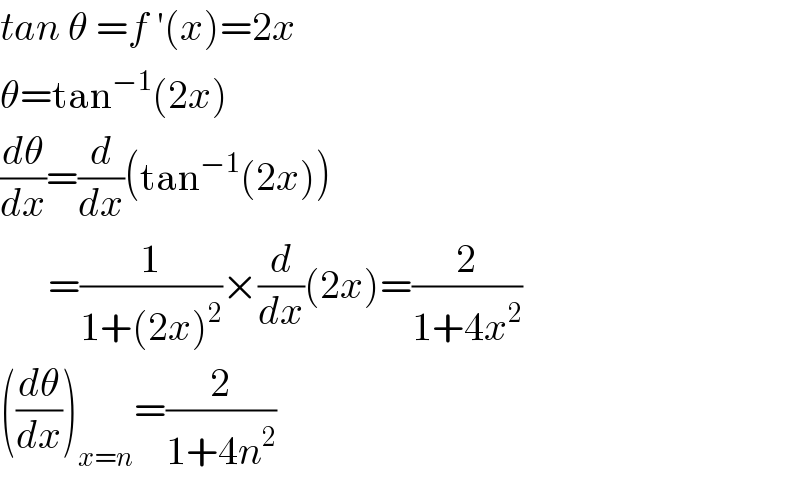
Question Number 3707 by Filup last updated on 19/Dec/15

$$\mathrm{lets}\:\mathrm{say}\:\mathrm{we}\:\mathrm{have}\:\mathrm{a}\:\mathrm{function}\:{f}\left({x}\right). \\ $$$$\mathrm{The}\:\mathrm{tangent}\:\mathrm{line}\:\mathrm{at}\:{x}={n}\:\mathrm{makes}\:\mathrm{an} \\ $$$$\mathrm{angle}\:\theta\:\mathrm{with}\:\mathrm{the}\:{x}−\mathrm{axis}. \\ $$$$ \\ $$$$\mathrm{What}\:\mathrm{is}\:\mathrm{the}\:\mathrm{rate}\:\mathrm{of}\:\mathrm{change}\:\mathrm{of}\:\mathrm{the}\:\mathrm{angle} \\ $$$$\mathrm{as}\:\mathrm{we}\:\mathrm{change}\:\mathrm{the}\:\mathrm{value}\:\mathrm{of}\:{x}? \\ $$$$ \\ $$$$\mathrm{Suppose}\:{f}\left({x}\right)={x}^{\mathrm{2}} \\ $$
Commented by Rasheed Soomro last updated on 19/Dec/15

$${tan}\:\theta\:={f}\:'\left({x}\right)=\mathrm{2}{x} \\ $$$$\theta=\mathrm{tan}^{−\mathrm{1}} \left(\mathrm{2}{x}\right) \\ $$$$\frac{{d}\theta}{{dx}}=\frac{{d}}{{dx}}\left(\mathrm{tan}^{−\mathrm{1}} \left(\mathrm{2}{x}\right)\right) \\ $$$$\:\:\:\:\:\:=\frac{\mathrm{1}}{\mathrm{1}+\left(\mathrm{2}{x}\right)^{\mathrm{2}} }×\frac{{d}}{{dx}}\left(\mathrm{2}{x}\right)=\frac{\mathrm{2}}{\mathrm{1}+\mathrm{4}{x}^{\mathrm{2}} } \\ $$$$\left(\frac{{d}\theta}{{dx}}\right)_{{x}={n}} =\frac{\mathrm{2}}{\mathrm{1}+\mathrm{4}{n}^{\mathrm{2}} } \\ $$
Commented by prakash jain last updated on 19/Dec/15

$$\mathrm{Rate}\:\mathrm{of}\:\mathrm{change}\:\mathrm{of}\:\mathrm{angle}\:\left(\theta\right)\:\mathrm{wrt}\:{x}=\frac{{d}\theta}{{dx}} \\ $$$${f}\left({x}\right)={x}^{\mathrm{2}} \\ $$$$\mathrm{tan}\:\theta=\mathrm{2}{x}\: \\ $$$$\mathrm{sec}^{\mathrm{2}} \theta\frac{{d}\theta}{{dx}}=\mathrm{2} \\ $$$$\left(\mathrm{1}+\mathrm{4}{x}^{\mathrm{2}} \right)\frac{{d}\theta}{{dx}}=\mathrm{2} \\ $$$$\frac{\mathrm{d}\theta}{\mathrm{d}{x}}=\frac{\mathrm{2}}{\mathrm{1}+\mathrm{4}{x}^{\mathrm{2}} } \\ $$
Commented by 123456 last updated on 19/Dec/15

$$\mathrm{so} \\ $$$$\mathrm{tan}\:\theta=\frac{{df}}{{dx}} \\ $$$$\theta=\mathrm{tan}^{−\mathrm{1}} \frac{{df}}{{dx}} \\ $$$$\frac{{d}\theta}{{dx}}=\frac{{d}}{{dx}}\mathrm{tan}^{−\mathrm{1}} \frac{{df}}{{dx}} \\ $$$$=\frac{\frac{{d}^{\mathrm{2}} {f}}{{dx}^{\mathrm{2}} }}{\mathrm{1}+\left(\frac{{df}}{{dx}}\right)^{\mathrm{2}} }??? \\ $$
